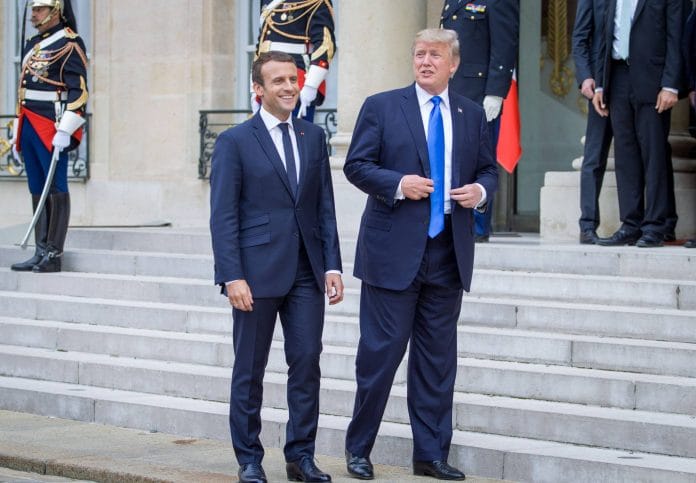‘Make America France again’
Bowled over by what he saw in France, Donald Trump is considering a Batille-Day style US military parade in Washington on the 4 July next year.
As Trump met Emmanuel Macron on the fringes of the UN general assembly, he asked his White House chief of staff “to look into the possibility of holding such a display of US military might”. And staying true to his style, Trump added that the US parade should be “bigger and better” than the one he saw in France.
“I don’t know. We’re gonna have to try and top it, but we had a lot of planes going over and a lot of military might, and it was really a beautiful thing to see,” Trump said.
Hours later, the news was all over Twitter, with Washington Post’s Adam Taylor tweeting “Make America France again?”
It’s all in the name for Xi Jinping
Xi Jinping’s political thought is all set be carved in stone, or at least, in China’s constitution. Chinese analysts have been wondering for a long time how Jinping’s political theories will be accommodated in the constitution. But the wait would soon be over since the party’s 25-member politburo has already discussed a draft amendment that will be tabled for discussion at the twice-a-decade meeting, which opens on October 18, according to reports in the Chinese media.
“China’s ruling party has published huge volumes on Xi’s political thoughts since he came to power five years ago. The inclusion of a personal political philosophy in the charter is an honour bestowed on several of Xi’s predecessors, but the big question now is whether the addition will also carry his name.”
“Once Xi’s name is incorporated in the constitution, his status in the party will be comparable to that of Mao (Zedong) and Deng (Xiaoping),” political analyst Zhang Lifan said.
Pakistan, US and the awkward tension at UN General Assembly
The UN General Assembly is going to come with a bunch of very thorny issues for Pakistan’s Prime Minister Shahid Khaqan Abbasi. Abbasi is all set to meet US Vice President Mike Pence. And much to the disappointment of the Pakistani establishment, the Abbas-Pence meeting is drawing more eyeballs than it would like.
“The prime minister is not here for US-Pakistan relations, this is a global meeting…Our policies are not unifocal,” Pakistan’s Permanent Representative to the UN said.
“The Trump administration sent not a very subtle message while scheduling President Donald Trump’s engagements with world leaders: Pakistan was kept out of even casual meetings with Mr Trump,” a report in Dawn said.
“But diplomatic sources in Washington say that PM Abbasi’s meeting with the US vice president also conforms to the Trump administration’s new strategy. The administration usually brings forward the vice president for detailed, strategic dialogues and the Abbasi-Pence meeting reflects Washington’s desire for holding serious talks with Pakistan on the Afghan issue.”
Time to starve Myanmar’s military?
Condemnation is all good and necessary, but in case of Myanmar’s all-powerful military chief and the man behind the vicious crackdown against the Muslim Rohingya minority, General Min Aung Hlaing, words are unlikely to yield much.
“The only thing that may get his attention is what forced the military to accept a measure of democracy in Myanmar: economic sanctions,” says this editorial in the New York Times.
“Yet with China backing Myanmar’s military, there is little chance the Security Council will vote for new sanctions. There is nothing, however, to stop the United States from acting on its own. Senator John McCain’s announcement on Tuesday that he would seek to halt plans to expand military ties with Myanmar is a step in the right direction. The Senate could go further and move to restore sanctions against Myanmar’s military unless the carnage stops, humanitarian aid groups are allowed back into Rakhine State, United Nations investigators are permitted to do their job there and the Rohingya are restored safely to their homes as full citizens of Myanmar,” the editorial says.
American college students think violence is an acceptable tool to counter hate speech
There’s something disturbing about the way college students in the US think hate speech should be dealt with. A nationwide survey of 1,500 students revealed that a fifth of them think “it’s acceptable to use physical force to silence a speaker who makes ‘offensive and hurtful statements’,”writes Catherine Rampbell in the Washington Post.
“Colleges pay a lot of lip service to ‘freedom of speech’, despite high-profile examples of civil-liberty-squelching on campus. The survey suggests that this might not be due to hypocrisy so much as a misunderstanding of what the First Amendment actually entails,” she explains.
“For example, when students were asked whether the First Amendment protects ‘hate speech’, 4 in 10 said no. This is, of course, incorrect. Speech promoting hatred — or at least, speech perceived as promoting hatred — may be abhorrent, but it is nonetheless constitutionally protected.”






